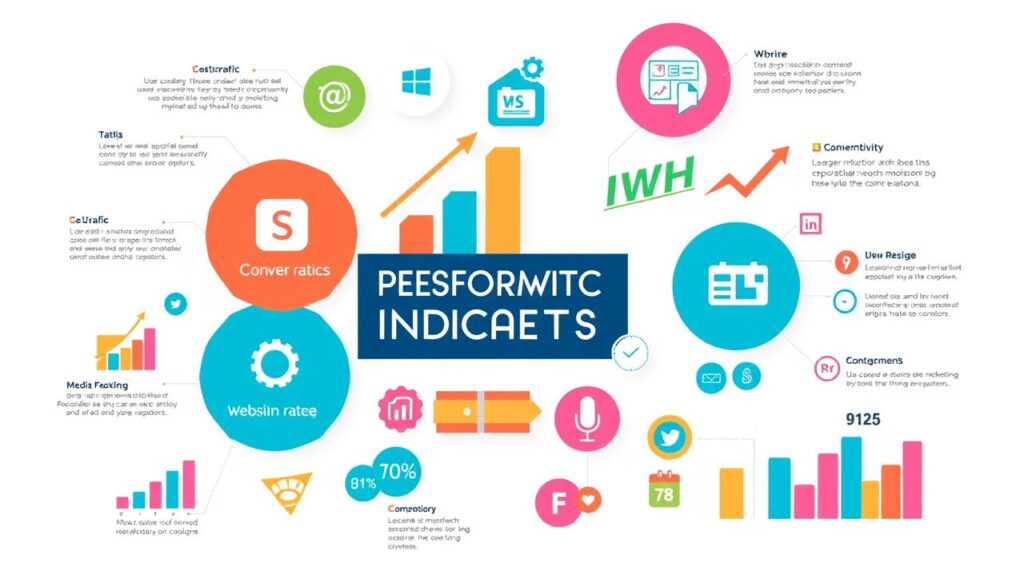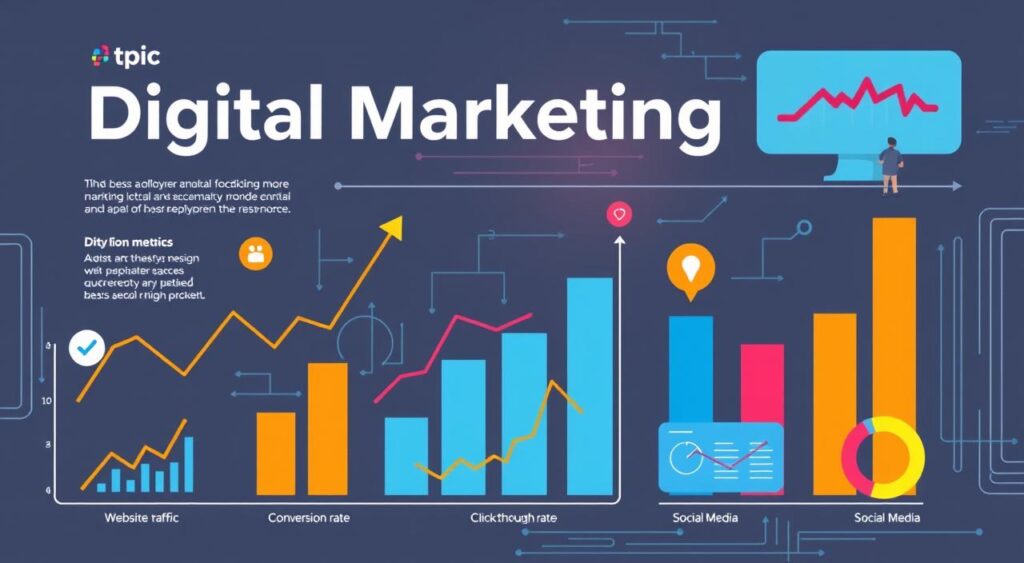In the fast-paced world of marketing, making decisions based on data is key for growth. Key performance indicators (KPIs) are at the core of this approach. They are the metrics that show if your marketing plans are working, help you see how you’re doing, and guide you to make better choices for your business.
This guide will dive into the importance of KPIs in marketing and how they help your business grow. You’ll learn about the key indicators that matter most to your business. By knowing these, you can make sure your marketing matches your goals and make smart choices that boost your return on investment (ROI).

Key Takeaways
- Key performance indicators (KPIs) are the essential metrics that measure the success of your marketing strategies.
- KPIs help you track your progress, make data-driven decisions, and drive business growth.
- Effective marketing KPIs are aligned with your overall business objectives and cover revenue, customer acquisition, and engagement metrics.
- Understanding and implementing the right KPIs can help you optimize your marketing efforts and maximize your ROI.
- Avoiding common mistakes like setting unrealistic goals and tracking too many metrics is crucial for effective KPI implementation.
Understanding Key Performance Indicators (KPIs) in Marketing
In the fast-paced world of marketing, key performance indicators (KPIs) are like a compass. They guide businesses towards their goals. These metrics help evaluate marketing success and growth drivers.
The Role of KPIs in Marketing Strategy
KPIs are key in shaping marketing strategies. They offer a data-driven way to make decisions. By tracking what are key performance indicators used for, you can spot strengths and areas for improvement.
Why KPIs Matter for Business Growth
Effective key performance indicators in business are crucial for growth. They help measure marketing impact and optimize resources. Understanding what does key performance indicator mean in marketing can lead to new growth paths.
Components of Effective Marketing KPIs
To create effective marketing KPIs, you need a strategic plan. Key parts include:
- Alignment with overall business objectives
- Measurability and quantifiability
- Relevance to your target audience and marketing activities
- Actionable insights for decision-making
- Continuous monitoring and adjustment
With these elements, you can build a strong KPI set. This set will guide your marketing strategy and growth.
“Measurement is the first step that leads to control and eventually to improvement. If you can’t measure something, you can’t understand it. If you can’t understand it, you can’t control it. If you can’t control it, you can’t improve it.”
– H. James Harrington, author and business consultant
What Are Key Performance Indicators in Marketing?
In marketing, key performance indicators (KPIs) are crucial. They help businesses see how well their campaigns are doing. These numbers act as guides, helping you check if your marketing plans are working and making smart choices to grow.
So, what are the top KPIs in marketing? Let’s look at the five key ones every marketer should know:
- Lead Generation: This KPI counts how many people might be interested in what you offer. This includes website visits, form submissions, or email sign-ups.
- Website Traffic: Watching your site’s traffic shows how many people see and interact with your content. It tells you about your marketing’s reach and how well it’s doing.
- Conversion Rate: This KPI shows how many people who visit your site or sign up for something actually do what you want them to. This could be buying something, signing up for a newsletter, or downloading content.
- Customer Acquisition Cost (CAC): Knowing how much it costs to get a new customer is key. It helps you see if your marketing is worth it and if you’re making money back.
- Return on Investment (ROI): This big KPI shows how much money you make from your marketing spending. It helps you see if your marketing is really paying off and how to make it better.
These KPIs are vital for checking and boosting your marketing’s success. By keeping an eye on these numbers, you can make smart choices, improve your campaigns, and help your business grow.
| Key Performance Indicator | Description | Example |
|---|---|---|
| Lead Generation | Tracks the number of potential customers who have expressed interest in your products or services | The number of website visitors who fill out a contact form |
| Website Traffic | Measures the number of visitors, page views, and unique visitors to your website | 10,000 monthly website visitors |
| Conversion Rate | Calculates the percentage of website visitors or leads who take a desired action | 2.5% of website visitors made a purchase |
| Customer Acquisition Cost (CAC) | Tracks the cost of acquiring a new customer | $50 spent on marketing to acquire a new customer |
| Return on Investment (ROI) | Calculates the financial return on your marketing expenditures | For every $1 spent on marketing, the business generated $3 in revenue |
By keeping an eye on these KPIs, marketers can make smart choices, improve their campaigns, and help their business grow.
Essential Marketing KPIs for Business Success
It’s key to measure your marketing’s success to grow your business. Key performance indicators (KPIs) give you insights into your marketing’s effectiveness. They help you make choices based on data. Let’s look at some important marketing KPIs for your company’s success.
Read More: What Are Demand Gen Campaigns: Drive Business Growth
Revenue and ROI Metrics
It’s vital to track your marketing’s financial impact. KPIs like total revenue, sales revenue, marketing-attributed revenue, and marketing ROI are important. They show which marketing efforts bring in the most money, helping you spend your budget wisely.
Customer Acquisition Metrics
Getting new customers is a big deal for many businesses. KPIs like customer acquisition cost (CAC), new customer acquisition rate, and lead conversion rate are key. They help you see how well your strategies work, so you can improve your marketing.
Engagement and Conversion Metrics
These metrics show how people interact with your marketing. Important ones include website traffic, bounce rate, time on site, click-through rate (CTR), and conversion rate. They help you see how your campaigns are doing and how to get better results.
By watching these marketing KPIs closely, you can really understand how your business is doing. You can make smart choices and help your business grow in the long run.
Digital Marketing KPIs You Need to Track
As a savvy marketer, you know how vital key performance indicators (KPIs) are. They help measure your online marketing success. This ensures your marketing efforts are worth it. Let’s look at the important digital marketing KPIs you should track to boost your campaigns and business growth.
Your website’s performance is key. Look at bounce rate, average time on page, and pages per session. These metrics show how users interact with your site. By tracking them, you can spot areas to improve and enhance the user experience.
Email marketing KPIs are also crucial. Keep an eye on open rate, click-through rate, and unsubscribe rate. They tell you how well your emails are doing. This helps you fine-tune your messages and who you send them to.
SEO KPIs is important too. Watch organic traffic, keyword rankings, and backlink profiles. They show how visible and authoritative your site is online. By monitoring these, you can improve your SEO and reach the right audience.
For paid ads, track cost-per-click (CPC), click-through rate (CTR), and return on ad spend (ROAS). These metrics help you see if your ads are effective and profitable. By focusing on these, you can better target your ads and spend your budget wisely.
| Digital Marketing KPI | Description |
|---|---|
| Bounce Rate | The percentage of visitors who leave your website after viewing only one page. |
| Average Time on Page | The average amount of time users spend on a specific page of your website. |
| Pages per Session | The average number of pages a user visits during a single session on your website. |
| Email Open Rate | The percentage of recipients who open your email. |
| Email Click-through Rate | The percentage of recipients who click on a link within your email. |
| Organic Traffic | The number of visitors who find your website through a search engine’s organic search results. |
| Keyword Rankings | The position of your website in search engine results for specific keywords. |
| Cost-per-Click (CPC) | The average amount you pay for each click on your paid advertising campaign. |
| Click-through Rate (CTR) | The percentage of ad impressions that result in a click. |
| Return on Ad Spend (ROAS) | The amount of revenue generated for every dollar spent on a paid advertising campaign. |
By keeping an eye on these key performance indicators in digital marketing, you can understand your online strategies better. This helps you make smart decisions to improve your what is KPI for marketing and grow your business sustainably.

Social Media and Content Marketing Performance Indicators
Understanding the right key performance indicators (KPIs) is key to success in social media and content marketing. Whether you’re looking at what are key performance indicators for social media or aligning with your key performance indicators in marketing plan, these metrics are crucial.
Social Media Engagement Metrics
Measuring engagement on social platforms is vital. Keep an eye on follower growth, likes, shares, comments, click-through rates, reach, and impressions. Also, track mentions and brand sentiment.
These metrics show how your audience interacts with your content. They help you spot areas for improvement.
Content Performance Analytics
Your content marketing strategy should also be closely tracked. Look at website traffic, bounce rates, time spent on page, lead generation, and conversions. Also, check search engine rankings and content engagement.
These key performance indicators in marketing plan reveal how well your content drives audience behavior.
Brand Awareness Measurements
Your social media and content efforts should boost brand awareness. Track brand mentions, website referrals, social media follower growth, and branded search volume. Also, look at click-through rates.
These what are key performance indicators for social media show how your marketing affects your brand presence and perception.
By watching these key performance indicators, you can make informed decisions. You can then optimize your strategies and get better results in social media and content marketing.
Implementing KPIs in Your Marketing Strategy
Creating a good marketing strategy is more than just coming up with new ideas. You need to use key performance indicators (KPIs) to see how well your marketing is doing. KPIs are crucial for any business, especially in the pharmaceutical industry, to grow.
First, pick the two key performance indicators of market that fit your goals. For example, in pharmaceutical marketing, you might track sales volume and market share. These key performance indicators in pharmaceutical marketing show if your campaigns are working and guide your decisions.
Choosing the right metrics is important, but understanding what do key performance indicators measure is key. KPIs can tell you a lot, like how well you’re getting new customers and if your marketing is worth it. By looking at these indicators, you can learn more about your audience, improve your messages, and make your marketing better.
| KPI | What It Measures | Why It Matters |
|---|---|---|
| Sales Volume | The total number of units or products sold | Indicates the overall demand and effectiveness of your marketing efforts |
| Market Share | The percentage of the total market occupied by your brand or product | Provides insights into your competitive position and the impact of your marketing strategies |
| Customer Acquisition Cost (CAC) | The cost of acquiring a new customer | Helps you understand the efficiency of your customer acquisition efforts and optimize your marketing budget |
Adding KPIs to your marketing plan is not a one-time thing. It’s something you do all the time. By always checking and changing your KPIs, you make sure your marketing is working towards your goals and growing your business.

Common Mistakes to Avoid When Setting Marketing KPIs
As a marketing pro, setting good key performance indicators (KPIs) is key. It helps measure your campaign success. But, there are common traps to avoid when setting your marketing KPIs. Steer clear of these to build a useful performance indicator framework for your business.
Setting Unrealistic Goals
One big mistake is setting marketing KPIs that are too high. It’s good to push your team, but not so high it feels impossible. Instead, aim for 5 key performance indicators that are tough but reachable. Use your past data and industry standards as guides.
Tracking Too Many Metrics
Another error is tracking too many performance indicators. It’s tempting to measure everything, but it gets too much. Focus on the top key performance indicators in marketing that matter most. These should match your business goals closely.
Ignoring Quality Data Analysis
Lastly, many skip analyzing their data. Just tracking key performance indicators isn’t enough. You need to dig into the numbers for real insights. Spend time analyzing your marketing KPI data. Look for trends and patterns to improve your strategies.
By avoiding these mistakes and setting smart, focused key performance indicators in marketing, you can drive business growth. This aligns with your marketing strategy.
Conclusion
Understanding and using key performance indicators (KPIs) in your marketing is key to success. Whether you’re into traditional marketing or digital marketing, the right KPIs offer deep insights. They help you measure and improve your campaigns.
Tracking things like revenue, ROI, customer acquisition, engagement, and conversion rates is important. The key performance indicators in marketing we’ve talked about are like a roadmap for your marketing. They help you make smart decisions, use resources better, and reach your business goals.
Mastering marketing KPIs is a continuous journey. But with dedication, flexibility, and focus on the right metrics, you’ll unlock your marketing’s full potential. Use data-driven insights to guide your business forward with your KPIs.
FAQ
What are key performance indicators in marketing?
Key performance indicators (KPIs) in marketing are specific metrics. They help measure the success of your marketing campaigns. KPIs give you quantifiable data to track progress and make informed decisions.
Why are KPIs important for marketing?
KPIs are key for marketing because they help align your efforts with business goals. They measure campaign performance and identify areas for improvement. This leads to better decision-making and shows the value of your marketing.
What are the key components of effective marketing KPIs?
Effective marketing KPIs have specific and measurable goals. They align with your business objectives and are relevant to your audience. They provide actionable insights and are tracked consistently over time.
What are some examples of key performance indicators in marketing?
Examples of marketing KPIs include revenue and ROI metrics. Customer acquisition and engagement metrics are also important. These help measure the success of your marketing efforts.
What are the essential digital marketing KPIs to track?
Essential digital marketing KPIs include website performance metrics. SEO and paid advertising metrics are also crucial. Social media engagement metrics help measure your online presence.
How can I effectively implement KPIs in my marketing strategy?
To implement KPIs effectively, align them with your business goals. Choose relevant and measurable KPIs. Set clear targets and benchmarks. Regularly monitor and analyze your data. Use insights to optimize your campaigns.
What are common mistakes to avoid when setting marketing KPIs?
Avoid setting unrealistic goals and tracking too many metrics. Make sure your data is accurate and relevant. Connect KPIs to your business objectives. Don’t forget to continuously monitor and optimize your efforts.
𝐒𝐰𝐚𝐠𝐚𝐭 𝐆𝐚𝐰𝐚𝐝𝐞
Digital Marketer | Content Creator | Growth Strategist
With 2 years of hands-on experience in the dynamic world of digital marketing, Swagat Gawade specializes in crafting compelling strategies that drive growth and engagement. From managing ad campaigns to optimizing SEO, Swagat has a proven track record of boosting brand visibility and achieving measurable results.
Key skills:
𝐒𝐨𝐜𝐢𝐚𝐥 𝐌𝐞𝐝𝐢𝐚 𝐌𝐚𝐫𝐤𝐞𝐭𝐢𝐧𝐠: Building impactful campaigns that resonate with audiences.
𝐂𝐨𝐧𝐭𝐞𝐧𝐭 𝐌𝐚𝐫𝐤𝐞𝐭𝐢𝐧𝐠: Creating engaging, high-quality content tailored to target markets.
𝐒𝐄𝐎 & 𝐒𝐄𝐌 𝐄𝐱𝐩𝐞𝐫𝐭𝐢𝐬𝐞: Ensuring brands rank high and stay competitive in search results.
𝐀𝐧𝐚𝐥𝐲𝐭𝐢𝐜𝐬 𝐏𝐫𝐨𝐟𝐢𝐜𝐢𝐞𝐧𝐜𝐲: Leveraging data to refine strategies and enhance ROI.
Swagat’s passion for learning fuels a constant pursuit of innovative marketing solutions, making him a valuable asset in today’s fast-evolving digital landscape.


